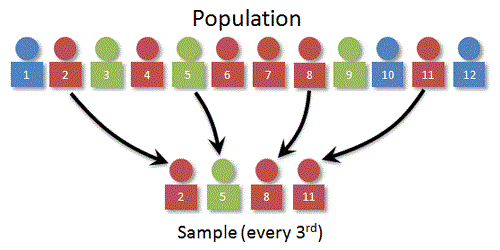Difference Between Population and Sample

Population vs. Sample
The word “population” simply means the body or the total number of inhabitants of the same species in a place or territory, whether it’s a country, city, state, or any area or district. It could also pertain to a particular race or class. An example of this is the native population or the student population. Populations can either be small or large depending mostly on the geographical area that you are focusing on. In statistics, however, the word “population” takes on a slightly different meaning; it may refer to individuals that are not necessarily animate. It is the group of data, individuals, specimen, or items from which you are to obtain your information for your statistical study. Population is also sometimes called “universe.” It is the full or entire collection to be analyzed or studied, and holds the total subject of interest.
A sample is a small portion or part taken from something, whether it’s a particular race, inhabitants, data, or items to show or to be the representative of the whole. Its significance in statistics is fairly similar to its original meaning. In statistics, a sample represents a portion of the population you are going to test or study; in other words, it is a subset of the population, a slice of it and all of its characteristics. A sample should be randomly drawn so that there is no bias, and so that you can be sure that your sample covers all the characteristics of your chosen population – otherwise your result is invalid. In short, we can simply say that every individual of the sample that you have selected is a member of your target population. It is helpful to obtain samples, as it is difficult to study and obtain your needed information from the entire whole.
Here are some advantages of gathering samples instead of surveying or studying the whole population. First of all, in researching and gathering your information, it would be costly and very impractical to actually study the whole rather than a random sample of it. Always keep in mind that samples also possess the characteristics of the population. You don’t need to survey everyone just to get the idea of their qualities. Secondly, you will save time by just focusing on your sample; it would take a long time to survey, gather information, and analyze the results of the population as a whole. Due to it being time consuming and having a lot of data to analyze, the possibility of committing errors is higher. You have a bunch of data that you might overlook. Samples are more controllable and easier to handle and study. Always be sure that your sample is selected randomly so that you have a better view of the qualities or information that you are looking for in the population.
Summary:
1.A population pertains to the whole. A sample is a part of the population that you randomly select to represent the whole.
2.Every member of your sample belongs to the population, which means that every individual in your sample bears the characteristics of the population.
3.To arrive at more accurate results in your study, you must select your sample randomly and without any bias.
4.Conducting a survey or study of the whole population has a greater possibility of erroneous results than having to study only your controlled sample.
5.The population bears the whole subject of interest, while the sample is just a part of the subject of interest.
- Differences Between Fraternity And Sorority - January 8, 2014
- Differences Between Lucite and Plastic - January 7, 2014
- Differences Between Oil and Butter - January 6, 2014
Search DifferenceBetween.net :
 Email This Post
: If you like this article or our site. Please spread the word. Share it with your friends/family.
Email This Post
: If you like this article or our site. Please spread the word. Share it with your friends/family.
Leave a Response
References :
[0]https://faculty.elgin.edu/dkernler/statistics/ch01/1-4.html

